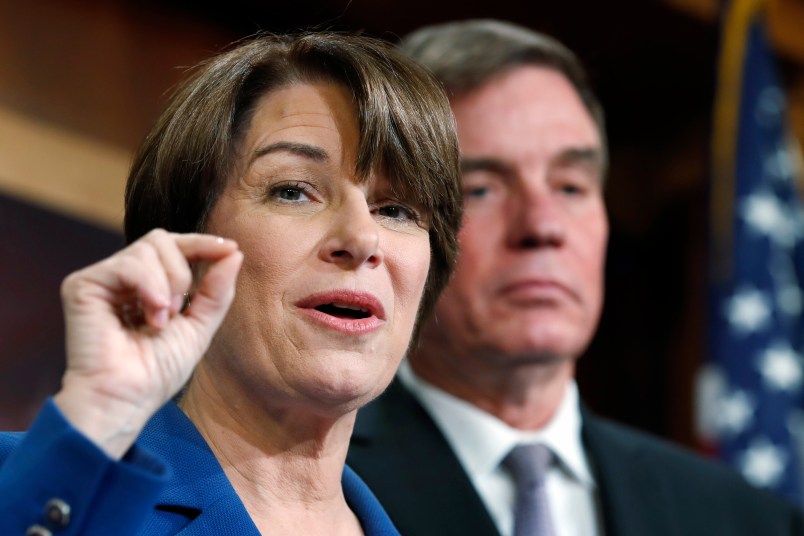Democratic senators on Thursday announced legislation co-sponsored by Sen. John McCain (R-AZ) that would require major social media platforms to label political ads in much the same way they’re disclosed on television and radio.
The bill, The Honest Ads Act, comes in response to growing evidence that Russia exploited a number of social media platforms to interfere with the 2016 election and exacerbate divisions in U.S. political discourse. A companion bill, sponsored by Reps. Derek Kilmer (D-WA) and Mike Coffman (R-CO), is being introduced in the House.
“Our next election is only 383 days away. Russia will keep trying to divide our country and worse than that, we may have other foreign interests trying to divide our country,” Sen. Amy Klobuchar (D-MN) said in a press conference Thursday with fellow co-sponsor, Sen. Mark Warner (D-WA).
They stressed that, aside from what Russia did in the 2016 campaign, campaign transparency laws have not evolved fast enough to keep up with technological innovations.
The legislation would take a three-pronged approach to addressing foreign political interference on social media, according to a summary of the bill circulated by the sponsors. It would amend the 2002 Bipartisan Campaign Reform Act so that its electioneering communication requirements apply to internet and digital advertisements. It would require that major internet platforms—those with an average of 50 million or more monthly viewers—document when a person or a group has spent more than $500 total on electioneering ads. A publicly available file would include targeting info, total page views, purchasing rates and purchaser contact info for those ads. The bill also would require that internet platforms make “reasonable efforts to ensure that foreign individuals and entities are not purchasing political advertisements in order to influence the American electorate,” according to the summary.
Tech companies have been resistant to past attempts to regulate them, and Warner previously has been critical of social media platforms’ slowness to cooperate with the Russia investigation underway at Senate Intelligence Committee, which he vice-chairs. Warner said Thursday that “it is in their own self interest to work with us,” pointing to the consumer trust that those companies depend on, and called the legislation a “light touch approach.”
Facebook said in a statement from its U.S. public policy vice president, Erin Egan, that it stood “with lawmakers in their effort to achieve transparency in political advertising” and that it looked “forward to continuing the conversation with lawmakers as we work toward a legislative solution.”
A Twitter spokesperson said that the company looked “forward to engaging with Congress and the FEC on these issues.”
A Google spokesperson said that the company supports “efforts to improve transparency, enhance disclosures, and reduce foreign abuse” and will “work closely with lawmakers, the FEC, and the industry to explore the best solutions.”
All three companies have been invited to testify publicly in front of the Senate Intel panel next month, and the House Intelligence Committee is working on its own open hearing on Russia’s use of social media.
Warner said that there have been discussions with other lawmakers to co-sponsor the bill, and other members of the Intel Committee are waiting for the November hearing to hear what tech companies have to say about the proposal.
Update: This story has been updated to include a response from Google.







“But we’re the internet. We don’t have to obey regular laws.”
Slightly OT. If you are a Facebook user and hate their ads and sponsored posts and other crap, Firefox + Adblock + F.B. Purity will chop out all of that crap. During the last couple of years I’ve never seen a ad or a “sponsored” story. It really works. It’s a floor wax AND a dessert topping! It’s both! I wasn’t propagandized over the last few years.
So…FUCK YOU PUTIN!
That actually felt good.
Sorry, just flashed back to the old Lily Tomlin telephone operator skits of ages ago. “We are the telephone company. We are not subject to local, state, or federal regulation. We are omnipotent.”
https://www.youtube.com/watch?v=ZIOogEaO3Hc"A Twitter spokesperson said that the company looked “forward to engaging with Congress and the FEC on these issues.”
No, they don’t.
if all this stuff makes you feel good, that’s fine. but it’s not really addressing the underlying, more salient issues.